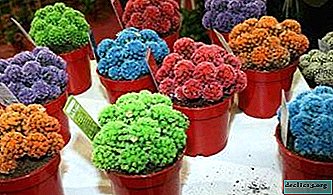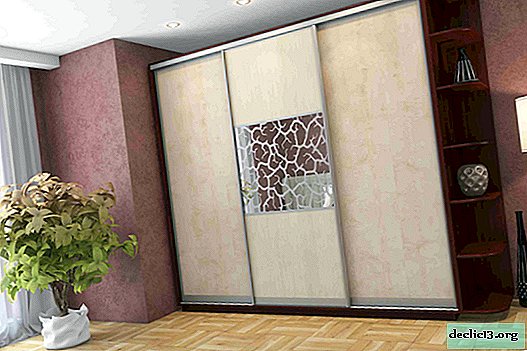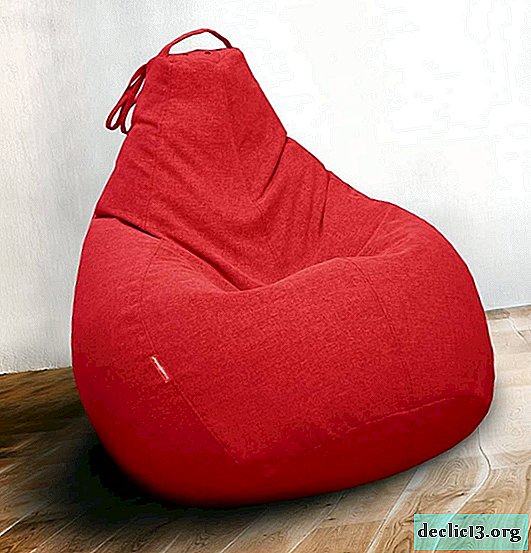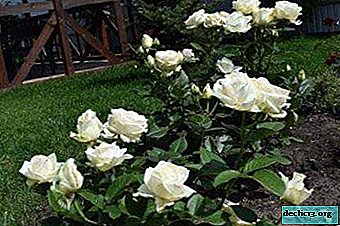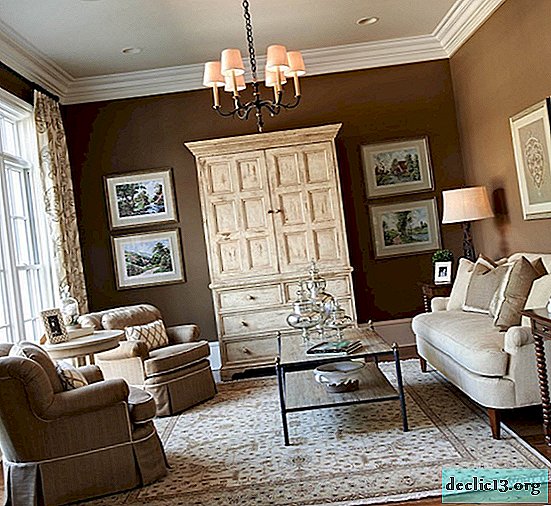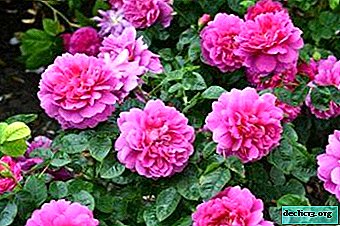Japanese-style traditional beds, design features
Lying on the bed a person spends a significant part of his life. Therefore, it is very important to take into account its features and characteristics. Ascetic and unusual for Europeans, the Japanese-style bed will certainly appeal to fans of minimalism and will fit perfectly into the laconic interior. What are the main differences between a Japanese bed and others?
The main differences from other styles
The main features of the Japanese bed are earthliness, low thick legs or their absence. The low location is associated with the centuries-old tradition of people sleeping on a mat. By the way, even today many Japanese people do not feel comfortable in a modern comfortable bed.
In Japan, this furniture is called "tatami", which is translated into Russian as "folding and unfolding things" or "hard folding mat." The Japanese bed is universal furniture: after sleep, it can be used for a completely different purpose. Having removed the mattress and laid out small pillows, you will turn the sleeping structure into a place for a meal. Various objects are conveniently placed on a pedestal: candles, souvenirs, books, other things.
Another nuance that distinguishes the Japanese bed from other models is that it consists exclusively of materials of natural origin. Usually it is a wooden base and leather upholstery. The tatami also has a smooth, non-textured surface and a rather restrained color palette.
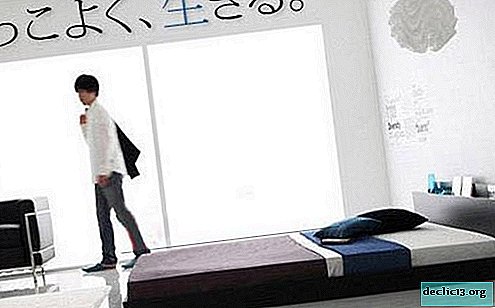




Materials and their combinations
Interior design in the "Japanese" style is a whole philosophy based on the unity of nature and man. Therefore, Japan produces furniture from environmentally friendly coconut wood without the use of various dyes and varnishes. Individual instances are quite creative: they are created in the form of beds upholstered with high-quality leather, these are:
- Buffalo leather - prestige, durability;
- Ecoskin - a noble look, ecological purity;
- Microfiber leather - elegance, high water resistance, excellent breathability.
Thanks to the combination of materials that emit life-giving energy, this unusual and natural bed will make the bedroom interior fashionable, extraordinary and comfortable, as well as fill it with aesthetic meaning and pacification. Although Western manufacturers are making adjustments to the development of new models, they adhere to the general concept of the South Asian style.





Appearance and decor
Designing a place to sleep in a Japanese spirit, abandon a large chic bed with elaborate elements or a model of a bright shade. The traditional tatami bed denies volumetric dimensions, any decoration, gilding, unnatural color. The bed in this stylistic direction has simple geometric silhouettes with no frills, as well as a color as close to natural as possible.
The form
The design of the bed is a mundane wooden frame with slats. Low legs (usually 4 pieces) are located closer to the middle. If there is a fifth leg, then it is located in the center. The advantage of a Japanese bed is stability. However, this plus becomes a disadvantage when a neat housewife needs to move furniture.
The true Japanese bed should be low and wide, approximately 20x120-180x200 cm (HxWxD). If proportions are not respected, it is impossible to achieve authenticity with the chosen stylistic direction.
A very convenient model, which is complemented by a side shelf. It can fit the necessary items: a favorite book or a cup of tea. Often the shelf is at the head. Some models have a laundry compartment in the form of drawers or a lifting mechanism. If the bed has a sill, then it plays a purely decorative role.





Decor
To create a "Japanese" atmosphere in your bedroom, you can not be limited to an exceptionally low bed. It is necessary to take into account other nuances that will help reflect the desired situation:
- The Japanese bedroom should not be overloaded with decorative elements;
- It is allowed to hang a picture on the wall. But decorating a room with family photos in Japan is not accepted;
- A small zest to the interior will give a fan, a vase and a figurine;
- Organic with a low bed will look mat.
The foundation of the Japanese lifestyle is a golden rice mat with a peculiar smell. She fills the room with the spirit of the land of the Rising Sun.





Color and Textile
Just looking at the wide, low Japanese-style bed will bring you into the atmosphere of an East Asian night. This is achieved through a visual effect. The Japanese interior does not welcome the brightness of artificial colors. Of course, reddish or orange shades may be present in it, but as separate fragments.
Preference is given to natural tones:
- Brown;
- White;
- Black;
- Light green;
- To pink.
The color scheme should be simple and strict. Usually it is 1-3 basic shades. The textiles in the Japanese bedroom are also discreet. For bedding, silk or cotton fabric is suitable. It is desirable that it be monophonic, but a restrained print is allowed.





Futon mattress
Many models come with futon - a traditional Japanese cotton mattress stuffed with wool and cotton. The filler sometimes includes rice straw. All the components of the mattress are selected so that it retains its shape for many years.
A hard cover is worn on a hard material, impregnated with a tool that protects a person from various parasites and microbes. After sleeping, the futon is rolled up, then it is tidied up in a cabinet with sliding doors.
Rice straw is laid in a mattress using a unique technology. This helps to relax the neck and back, guarantees a complete rest of the body during sleep.
So, the Japanese-style bed stands out:
- Laconic forms;
- Smoothness;
- Non-surface finish;
- Materials of natural origin;
- Restrained color palette;
- The presence of a special mattress.
The discreet appearance of the ascetic model will certainly appeal to fans of minimalism and will perfectly fit into a restrained interior.





Historical facts
Traditional Japanese houses were built to suit the local climate, which was warm and humid. The basis of the dwelling was a light wooden frame, earthen floor and thatched roof. Instead of internal walls, sliding partitions (fusuma) were used.
The life of a Japanese of distant eras was a "floor" life. In his house there were no chairs and beds, all were located on rugs. In the daytime, the Japanese family gathered around a low table, at which there was a meal and tea party. The decoration of the house was completely ascetic. The room was decorated with a stone lantern, which also served as a lamp.
Since ancient times, residents of Japan are accustomed to sleeping on the floor or on a straw mat. A pillow was a log or a wooden head stand, in which a rotating cylinder was mounted. But the wealthy Japanese preferred tatami mats, although at that time they were tougher and more uncomfortable than modern futons. The family was covered in one blanket.
Since the 17th century, residents of a distant eastern country began to use bedding. In their everyday life, cotton futons appeared, filled with wool, cotton or linen. At first, they were very expensive, so only the wealthiest Japanese bought them.
Despite the asceticism inherent in local life, the striking Japanese style possessed a bewitching atmosphere, which it has preserved to this day. So, a modern tatami bed:
- Consists exclusively of natural materials;
- It is characterized by a strict, concise design: low wide platform, on which there is a hard mattress tatami;
- Helps those with spinal problems;
- Can serve as a place for a meal;
- It has a protruding platform on which you can place books, candles and other necessary items.
The Japanese bed will create the illusion of spaciousness in your room, fill it with the pacification of unhurried Japanese philosophy, and also add oriental charm to the interior.





Photo

















